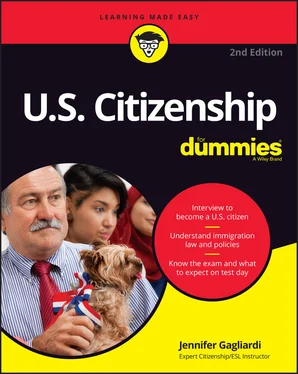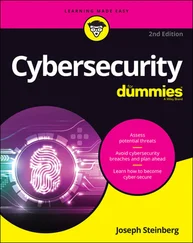Jennifer Gagliardi - U.S. Citizenship For Dummies
Здесь есть возможность читать онлайн «Jennifer Gagliardi - U.S. Citizenship For Dummies» — ознакомительный отрывок электронной книги совершенно бесплатно, а после прочтения отрывка купить полную версию. В некоторых случаях можно слушать аудио, скачать через торрент в формате fb2 и присутствует краткое содержание. Жанр: unrecognised, на английском языке. Описание произведения, (предисловие) а так же отзывы посетителей доступны на портале библиотеки ЛибКат.
- Название:U.S. Citizenship For Dummies
- Автор:
- Жанр:
- Год:неизвестен
- ISBN:нет данных
- Рейтинг книги:3 / 5. Голосов: 1
-
Избранное:Добавить в избранное
- Отзывы:
-
Ваша оценка:
- 60
- 1
- 2
- 3
- 4
- 5
U.S. Citizenship For Dummies: краткое содержание, описание и аннотация
Предлагаем к чтению аннотацию, описание, краткое содержание или предисловие (зависит от того, что написал сам автор книги «U.S. Citizenship For Dummies»). Если вы не нашли необходимую информацию о книге — напишите в комментариях, мы постараемся отыскать её.
U.S. Citizenship For Dummies
U.S. Citizenship For Dummies
U.S. Citizenship For Dummies — читать онлайн ознакомительный отрывок
Ниже представлен текст книги, разбитый по страницам. Система сохранения места последней прочитанной страницы, позволяет с удобством читать онлайн бесплатно книгу «U.S. Citizenship For Dummies», без необходимости каждый раз заново искать на чём Вы остановились. Поставьте закладку, и сможете в любой момент перейти на страницу, на которой закончили чтение.
Интервал:
Закладка:
Interviewing for a green card
You need to live in the United States as a lawful permanent resident for at least three to five years before you can qualify for naturalization. Look at obtaining your green card as taking the first step toward citizenship.
 Wives or husbands of U.S. citizens who die while honorably serving in the U.S. military (not necessarily during a time of hostilities) do not need to meet the residence or physical presence requirements; they just need to be a legal permanent resident at the time they file for naturalization.
Wives or husbands of U.S. citizens who die while honorably serving in the U.S. military (not necessarily during a time of hostilities) do not need to meet the residence or physical presence requirements; they just need to be a legal permanent resident at the time they file for naturalization.
For example, assume you’re a qualified applicant for permanent residence and you have a qualified sponsor — usually your employer or a spouse or other family member. You can prove these facts and have sent the USCIS all the necessary applications and documents covered in Chapter 4. You’ve prepared your case and have kept careful records of all the paperwork you’ve ever sent to the USCIS. Because immigration laws can be complicated, you’ve probably consulted an attorney or received other professional help in preparing your case up to this point. It’s been a long road, but you’ve done the work and now you’re ready to take the final step toward lawful permanent residence — interviewing with the USCIS (if you’re adjusting your status while in the United States) or interviewing with a consular officer (if you’re applying at an overseas consulate).
 In many employment-based cases, the USCIS does not require an interview. If you receive an interview notice, however, don’t be nervous about your interview. Be prepared! Here’s what to expect: At the beginning of the interview, the USCIS officer will place you under oath. This means that you swear to tell the truth at all times during the interview. The officer will then review your file and ask you questions about the answers you gave on your application. Be prepared to answer questions about whether you have a criminal record or have ever been involved in deportation proceedings or any of the other permanent or temporary bars to immigration outlined in Chapter 8.
In many employment-based cases, the USCIS does not require an interview. If you receive an interview notice, however, don’t be nervous about your interview. Be prepared! Here’s what to expect: At the beginning of the interview, the USCIS officer will place you under oath. This means that you swear to tell the truth at all times during the interview. The officer will then review your file and ask you questions about the answers you gave on your application. Be prepared to answer questions about whether you have a criminal record or have ever been involved in deportation proceedings or any of the other permanent or temporary bars to immigration outlined in Chapter 8.
The USCIS officer will also review your medical examinations. The officer will ask if there is anything you want to correct about the background and biographical information you provided the USCIS. If anything has changed or you feel your documents contain inaccurate information, now is the time to speak up.
If your case is based on employment, the officer may also review your Department of Labor paperwork. They may ask questions about your job to determine whether you really worked in the occupation you claim when you lived in your native country. The officer may also want to know whether you have the necessary skills to perform the job in the United States.
Be prepared to answer questions designed to determine whether you’ve been working illegally while waiting for your green-card application to be approved.
 Some applicants aren’t allowed to work in the United States while waiting to get their green cards — and working illegally provides grounds for the USCIS to deny your application. As long as you’re truthful and have followed the rules, you should have nothing to worry about.
Some applicants aren’t allowed to work in the United States while waiting to get their green cards — and working illegally provides grounds for the USCIS to deny your application. As long as you’re truthful and have followed the rules, you should have nothing to worry about.
If your case is based upon your marriage to a U.S. citizen, the interviewing officer will ask questions about your marriage and life together. The USCIS wants to feel confident that yours is a true marriage and not a union of convenience designed to get you into the country. The USCIS will require your spouse to come to the interview, and they can choose to interview you separately or as a couple.
In some cases, the officer will need additional information and paperwork in order to make a decision. If this happens in your case, the USCIS officer will reschedule you to return with the requested items another day.
If all goes well and the officer doesn’t need any more documentation, they will issue you an approval and you’ll be asked to return to the USCIS to get your passport stamped — as a lawful permanent resident. If you’ve been married to your U.S.-citizen spouse for less than two years, your passport will be stamped as a conditional permanent resident — conditioned on your still being married after two years. At that time, you may have the condition removed to become a full lawful permanent resident, which may require another interview with the USCIS. In either case, you won’t actually receive the green card itself for several months, although your new immigration status takes effect with the stamping of your passport.
 All applicants for adjustment of status are entitled to work authorization. If you’re in the United States waiting to go to an overseas consulate to process, you have to maintain a status that permits employment (see Chapter 3for more information) and only work pursuant to your status.
All applicants for adjustment of status are entitled to work authorization. If you’re in the United States waiting to go to an overseas consulate to process, you have to maintain a status that permits employment (see Chapter 3for more information) and only work pursuant to your status.
Obtaining U.S. citizenship
Assume you’ve been a lawful permanent resident of the United States for at least five years or, if your permanent resident status is based on marriage, you’ve been married to and living with your U.S.-citizen spouse for at least three years. If you’re a man between the ages of 18 and 26, you’ve registered for the draft with Selective Service. You’ve properly completed and filed your Application for Naturalization Form (Form N-400) and supplied the USCIS with all the necessary documents and paperwork (you can find more on this in Chapter 4). Now comes the final step in the process of becoming a citizen: the USCIS interview.
Although it only takes about 10 to 15 minutes, the interview fills many prospective citizens with fear and dread. After all, you not only have to be prepared to answer questions about yourself, you also have to prove that you know how to read and write one dictated sentence in English plus answer six out of ten questions correctly from a list of one hundred U.S. history, government, and civics questions.
We know it sounds intimidating, but if you do your homework, you’ll have nothing to worry about. USCIS examiners don’t expect you to know everything about the United States. Nor do you have to be an English professor to pass the language test. If you can read and understand this book, you can pass the English text. If you’re having trouble, don’t worry. We give you some fun and easy ways to improve your skills.
 USCIS officers are required to give “due consideration” to your education, background, age, length of residence in the United States, opportunities available, and efforts made to acquire the requisite knowledge, along with any other elements or factors relevant to appraising your knowledge and understanding. As far as U.S. history and civics are concerned, the USCIS wants to know you understand the principles that the United States stands for. Finding out about history helps you understand how the United States became the great nation it is today. Parts 3, 4, and 5of this book help you prepare for the history and civics test, but we predict that you already know more than you think you do.
USCIS officers are required to give “due consideration” to your education, background, age, length of residence in the United States, opportunities available, and efforts made to acquire the requisite knowledge, along with any other elements or factors relevant to appraising your knowledge and understanding. As far as U.S. history and civics are concerned, the USCIS wants to know you understand the principles that the United States stands for. Finding out about history helps you understand how the United States became the great nation it is today. Parts 3, 4, and 5of this book help you prepare for the history and civics test, but we predict that you already know more than you think you do.
Интервал:
Закладка:
Похожие книги на «U.S. Citizenship For Dummies»
Представляем Вашему вниманию похожие книги на «U.S. Citizenship For Dummies» списком для выбора. Мы отобрали схожую по названию и смыслу литературу в надежде предоставить читателям больше вариантов отыскать новые, интересные, ещё непрочитанные произведения.
Обсуждение, отзывы о книге «U.S. Citizenship For Dummies» и просто собственные мнения читателей. Оставьте ваши комментарии, напишите, что Вы думаете о произведении, его смысле или главных героях. Укажите что конкретно понравилось, а что нет, и почему Вы так считаете.












